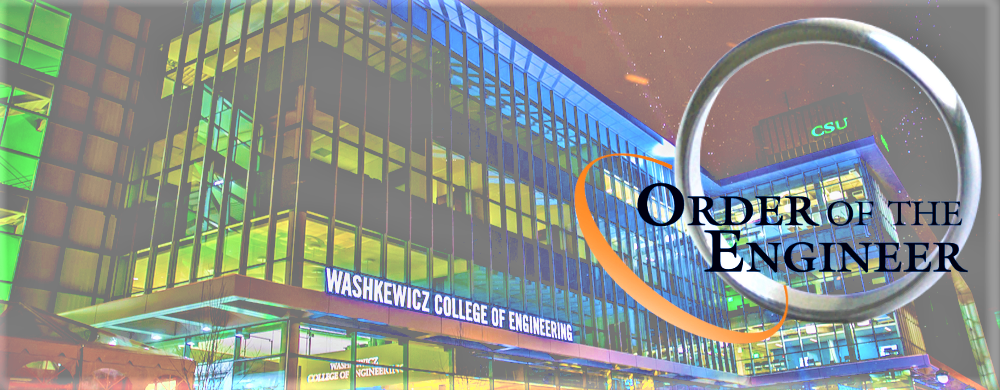Ringing in 50 Years of the Order of the Engineer

April 7 event celebrates order's Fenn College founding in 1970
The first Order of the Engineer Steel Ring Ceremony in the United States was held at Cleveland State University in the Washkewicz (then Fenn) College of Engineering on June 4, 1970. Nearly 170 students and faculty members participated.
On that day, students and faculty committed to professional responsibility based upon each participant accepting an obligation: individually pledging themselves to a “lifetime of unwavering commitment to the ethical practice of engineering, while upholding devotion to the standards and dignity of the engineering profession.”
It was, and remains, a formal recognition of two basic principles—namely that 1) the primary purpose of engineering is service to the public, and 2) that all engineers share a common bond. Those accepted into the order are given a symbol of unity, a steel ring, worn on the last digit of their working hand.
Today, there are 189 “links” (or chapters) of the Order in the U.S.; Washkewicz is known as Link One.
To celebrate the 50th Anniversary of the Order of the Engineer (make that “50+2,” due to a pandemic-induced postponement), CSU hosts a no-cost, open-to-the-public Ethics Symposium Thursday, April 7 from 2:30 - 4:15 p.m. It takes place in the Glasscock Ballroom on the third floor of the Student Center.
Speakers at the symposium will include:
Michael Loui, Ph.D., Professor Emeritus, University of Illinois at Urbana-Champaign
Ben Amaba, Ph.D., Chief Technology Officer, IBM Data Sciences
Brian Davis, Ph.D., Professor and Associate Dean, Washkewicz College of Engineering, CSU
Debbie Wells, Deputy Program Manager, Amentum Services Inc., Kennedy Space Center
The panel will be moderated by Arthur Schwartz, former Executive Director and General Counsel for the National Society of Professional Engineers. A ring ceremony will follow.
The Obligation of the Order
The Obligation is a creed similar to the oath attributed to Hippocrates (460-377 B.C.) that is generally taken by medical graduates and which sets forth an ethical code. The Obligation likewise, contains parts of the Canon of Ethics of major engineering societies.
Initiates, as they accept it voluntarily, pledge to uphold the standards and dignity of the engineering profession and to serve humanity by making the best use of Earth’s precious wealth. Since 1970, over 500,000 individuals have proudly accepted The Obligation.
From the beginning of the Order of the Engineer, the torch of ethics has often been carried by civil engineers. As we have moved into the digital era, this topic has a renewed relevance among all disciplines. It is ingrained in academic accreditation, as well as government and corporate cultures.
Whether it is a computer-controlled implantable device or a self-driving automobile or plane, the issues of public safety and ethics touch each sub-discipline of science and engineering.
The symposium will be dedicated to those 87 forward-thinking individuals, students, faculty and engineering professionals who originally created the ritual.
Those interested in attending can visit the Ethics Symposium registration page.